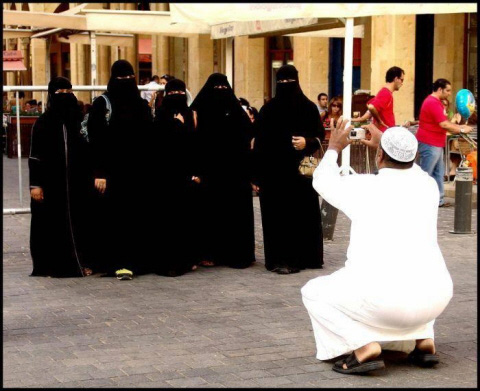02/22/2013
Daniel Pipes is a long-time scholar of Islam who has warned early and often about the intention of Muslims to institute world-wide sharia oppression on free peoples.
Interestingly, his home town of Philadelphia has had a major outbreak of crimes committed by burqa-wearing criminals. Burqas are a fine disguise for thievery, he notes, because it’s easier to ignore them than to confront the wearer.
Below, a security camera photo of a Philadelphia burqa bandit.

Pipes has compiled a blog post about burqa crime from 2006 to the present: Niqabs and Burqas as Security Threats, and it has gotten long over the years.
We have a better word in English for face covering: mask.
A mask connotes bad intent, secretiveness and crime. Showing our faces is part of the social contract of openness about who we are. A free society cannot allow unidentified persons because the masked individual has an advantage over the rest of us because he knows who we are but the reverse is not true.
There’s no reason to allow masks in public, even to celebrate diversity; they should be made illegal, as some states already have.
Furthermore, our culture teaches us to pay close attention to facial expressions — it’s how we judge honesty and emotions.
The purpose of the identical burqa is to erase the personal individuality of women, plus the message that women’s speech is worthless.

Here are the observations of Daniel Pipes, a concerned resident of Philadelphia:
PIPES: When burqas become accessories to crime, Washington Times, February 21, 2013
When it comes to using female Islamic garb as an accessory to crime, Philadelphia, the city where I live, has quietly, unassumedly, become the capital of the Western world.
First, a tutorial on Islamic coverings, all of which tend to be called veils in English, but which fall into three main categories. Some (the abaya, hijab, chador, jilbab or khimar) cover parts of the body, especially the hair, but reveal the face and identity of the woman; some cover the face (the yashmak) but show the body shape; and some hide everything, including the identity and gender of the wearer. The latter — our topic here — is best described as a full-body cover: it in turn has two types, those that cover the person entirely (the chadari or burqa) or those with a slit for the eyes (the haik or niqab).
By my count, the Philadelphia region has had 15 robberies (or attempted robberies) of financial institutions in the past six years in which the thieves relied on an Islamic full-body cover. These took place in January 2007, June 2007, May 2008 (two), October 2009 (two), November 2009, February 2011, June 2011, December 2011, January 2012, March 2012 (two) and April 2012 (two). The most violent one took place on May 3, 2008, when Police Sgt. Stephen Liczbinski was killed in a shootout following a robbery by perpetrators wearing burqas. One of the criminals also died in the exchange.
As David J. Rusin points out in his detailed survey of these crimes, Muslim garb holds two great advantages over other forms of disguise. First, plenty of covered women walk the streets of Philadelphia without criminal intent, thereby providing cover for thieves; the more head coverings around, the more likely it is that head coverings will facilitate criminal activity. Second, the very strangeness and aloofness of these garments affords their wearers an extraordinary degree of protection. As in other cases (notably a farcical purchase of alcohol in Toronto liquor stores by a 14-year-old boy in a burqa), clerks so fear being accused of racism or “Islamophobia” that they skip established methods, such as asking a niqabi to establish her (or his) identity.
In response, some banks have adopted policies of not allowing head coverings. For example, a PNC Bank branch office in Philadelphia boasts a sign stating: “The safety of our employees and customers is our foremost concern. We request that you remove any hats, caps, sunglasses or hoods while inside this financial institution.” Such policies may help account for the lack of burqa robberies in Philadelphia in almost a year.
Even if banks stop this crime wave, however, Islamic garb presents a more general danger. For example, a murderer wore an Islamic full-cover outfit in an attack at a barber shop in Philadelphia, also in April 2012, in which the owner was killed.
The abduction and rape of a 5-year-old child last month was less fatal, but equally horrific. A woman in a niqab signed Nailla Robinson out from the Bryant Elementary School in Philadelphia by pretending to be her mother taking the girl to breakfast. The girl then disappeared for nearly a day. Investigators believe the two walked a few blocks to where a man awaited them. Nailla was later found in a park by passersby. Last week, the police arrested Christina Regusters, 19, an employee at Bryant who apparently had prior contact with Nailla. Charges against her include criminal conspiracy, aggravated assault, kidnapping, rape and recklessly endangering another person.
The usual two factors noted above were critical to this crime’s commission: the spread of full-body gear (Nailla’s mother, Latifah Rashid, wears a niqab, meaning Ms. Regusters could plausibly pretend to be her) and the Bryant school staff deferring to a niqabi (completely ignoring the many rules that restrict the withdrawal of a child from school).
These crimes prompt several reflections: First, as full-body Islamic covers spread, criminals increasingly use them to perpetrate their offenses. Second, government workers and others need to get over their timidity and apply normal security procedures to those wearing full-body coverings. Third, this is deadly serious business, involving thefts, rapes and murders. Finally, this problem has a simple solution: Ban the niqab and burqa in public places, as has been done in France and Belgium.
Daniel Pipes (DanielPipes.org) is president of the Middle East Forum.
This is a content archive of VDARE.com, which Letitia James forced off of the Internet using lawfare.